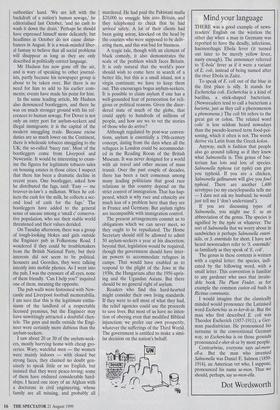Mind your language
THERE was a good example of news- readers' English on the wireless the other day when a man in Germany was reported to have the deadly, infectious, haemorrhagic Ebola fever (it turned out later to be merely yellow fever, nasty enough). The announcer referred to `E-bola' fever as if it were a variant of E. coli, instead of being named after the river Ebola in Zaire.
To speak of E. coli out of the blue in the first place is silly. It stands for Escherichia coll. Escherichia is a kind of bacillus, a stick-shaped bacterium. (Newsreaders tend to call a bacterium a bacteria, just as they call a phenomenon a phenomena.) The coli bit refers to the great gut or colon. The related word colic is less seldom heard nowadays than the pseudo-learned term food-poi- soning, which it often is not. The words derive via Latin from the Greek kolon.
Anyway, such is fashion that people also go around talking as if they knew what Salmonella is. This genus of bac- terium has lots and lots of species. Salmonella typhosa (or typhi) can give you typhoid. If you are a chicken, Salmonella gallinarum will give you fowl typhoid. There are another 1,400 serotypes (so my encyclopaedia tells me — I dare not ask my husband; he would just tell me I 'don't understand').
If you are discussing types of Salmonella, you might use S. as an abbreviation of the genus. The species is signified by the typhi or whatever. The sort of Salmonella that we worry about in sandwiches is perhaps Salmonella enteri- tidis, or S. enteritidis for short. I have not heard newsreaders refer to 'S. enteritidis' as familiarly as they speak of 'E. coli'.
The genus in these contexts is written with a capital letter; the species, indi- cated by the following word, with a small letter. This convention is familiar to any gardener who uses that invalu- able book The Plant Finder, as for example the common castor-oil bush is Ricinus communis.
I would imagine that the classically minded would pronounce the Latinised word Escherichia as es-ker-ik-ia. But the man who first described E. coil was Theodor Escherich (1857-1911), a Ger- man paediatrician. He pronounced his surname in the conventional German way, so Escherichia is on those grounds pronounced e-sher-ik-ia by most people.
Contrariwise, everyone says sal-mon- ell-a. But the man who invented Salmonella was Daniel E. Salmon (1850- 1914), an American vet who, I suppose, pronounced his name sa-mon. Thus we should, perhaps, say sa-mon-ella.
Dot Wordsworth


























































 Previous page
Previous page